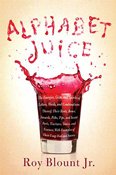In "Alphabet Juice" (Farrar, Straus and Giroux, 2008, $25), Roy Blount Jr. combs through the English language from its roots to its modern tips, and sweeps it into an up 'do of humorous and insightful sounds, usages, commands and complaints. From its opening chapter—depicting a fictional committee working on setting the sound a pig makes into letters—to its closing comments, Blount shows readers the progressions, connections and debates that have colored our language. Reading Blount's dictionary is like chaperoning a jungle gym full of words at play; you attentively watch them run amok and slip and slide as you sit back and enjoy the cool evening breeze.
Blount subtitles his book, "The Energies, Gists, and Spirits of Letters, Words, and Combinations Thereof: Their Roots, Bones, Innards, Piths, Pips, and Secret Parts, Tinctures Tonics, and Essences; With Examples of Their Usage Foul and Savory." That about covers it. The book is organized alphabetically and for each letter, Blount chooses three to eight words to dissect in each section. In his entries, you will find pronunciations and definitions, as in any dictionary, but also Blount's interpretations, frustrations, associations and recommendations relating to those words. He riffs on sounds and meanings to create a smart, comical book, though you won't find any of those words defined in it.
Under "M" you'll find: "menu-ese," which dissects our various (mis)pronunciations and (mis)appropriations of French words into the marketing of American cuisine. Thumbing to "S," you'll find "spoonerisms," "spot-on," and my favorite, "sesquipedalian." Blount defines this last term, writing: "(It) describes a long uncommunicative word used for the sake of showing off." One of the examples Blount uses is "pogonotomy," a word for "shaving." Blount explains: "Okay, pogon is the Greek for ‘beard,' but pogo evokes possum and ‘a toy for jumping around on' (OAD)—hence a reader would be excused for assuming that pogonotomy means removal of a possum or a pogo stick from the body."
In the "C" section, meanwhile, the triumvirate "cancan/Cancun/cooncan" appears as one entry. "I got to wondering whether these words had anything in common, so I went to Google," Blount writes. There, he found that cooncan is a card game played around the world (probably also in Cancun), that the derivation of the city named Cancun is uncertain but has something to do with snakes, and that a Google search of "cancan + no panties" returns no results. "This search engine has a long way to go, to encompass all of human knowledge," he concludes.
Blount collects his material from sources both saucy and serious, and gives equal weight to his evidence. Though he most commonly draws on the Oxford English and American Heritage dictionaries, you will find references throughout the book from Internet search engines, UrbanDictionary.com, slang dictionaries, the daily jibber-jabber of celebrities and average Joes, text messages, instant messages, newspapers and children. Often, Blount's cross-references within the book provide further room for outlandish and insightful connections. Flip between entries and ponder the connections between "probably," "scientese" and "arbitrary."
One way that Blount sticks to the common mold of usage books is in reinforcing the old curmudgeonly adage "Why can't the English teach their children how to speak?" For example, Blount's complete definition of "zoology" follows: "Pronounced zo-ology. Not zoo-ology. Look at the letters. Count the o's." Elsewhere, Blount seems a bit more serious about the power of the masses to butcher our native tongue. For example, he spends more than a page patiently explaining how "beg the question" originally meant, "assume as proven what is to be proven." Contemporary English speakers have co-opted this phrase to mean, "Unavoidably raises the question." His solution? "So don't use it. Just discard that arrow from your quiver. … Once the classic meaning of a phrase begins losing ground to a less useful but more apparent one, it's time to tell it goodbye."
If none of Blount's first 22 books could impress you, perhaps nothing will, but those who find joy in brain synapses firing and twittering at a charming turn of phrase are in for a real treat with "Alphabet Juice." It's a wonderful record of how we use words and create meaning in 2009. With the Internet, text messaging, radio, books and TV, we are fitting more meaning into ever-shorter words and exchanging these messages faster and farther each year. Blount's new book reflects these circumstances in form and content, bringing us an informal, interconnected snapshot of modern American English.



Comments
Use the comment form below to begin a discussion about this content.
comments powered by Disqus